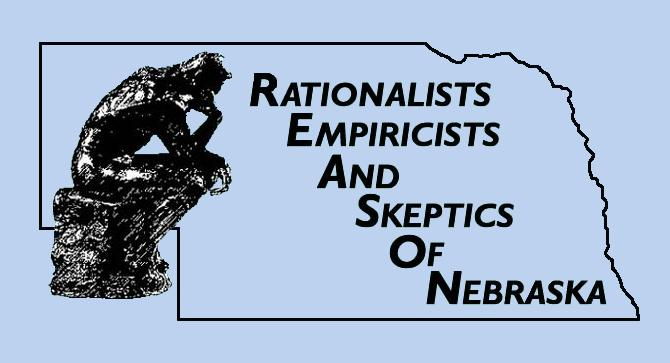America's Retreat From Science
Lecture April 10, 2004 by Norm Levitt, author of Prometheus BedeviledJust how apathetic our culture is to the fact that 93% of the population is judged to be "scientifically illiterate" can be seen in the failure of local media to adequately publicize this event. The World Herald routinely lists all kinds of talks under "Lectures" in their Thursday "GO!" section, but failed to list this. (I inquired why, but never received a response.)
Prof. Levitt described his talk as "further thoughts since" his last book, and indeed it was loosely structured, but that added to the enjoyably informal feel of it. Prof. Levitt said it is "deeply troubling" to scientists to see what is happening. University science budgets and student enrollments are declining and science illiteracy rising, but these are symptoms, not the cause -which lies with underlying cultural assumptions. Even the best sociologists would have a hard time devising polls to gauge what level of science literacy is enough. Although polls show science is still high in prestige, there is the deeper question of the integration of the scientific world view into the culture. Science is the only successful epistemological enterprise our species has produced in the last 200,000 years, and deserves deference in its areas of competence. The idea that we each create "our own reality" is popular but incompatible. Although there was never a "Golden Age," the status of science has gone downhill in the last 50 years, since its height 1945-1965, when science made us dominant in the post-WW2 period, when it was seen as our trump card against the Asiatic hordes of the Cold War. [One thinks of Gen. MacArthur wanting to drop A-bombs beyond the Yalu River.] Religion is stronger here than in our "ancestral cultures" of Europe, but in the post-WW2 period religion was less combative than now.
Copernicus is a "nice metaphor" for the diminished place of humans in a huge and indifferent "Douglas-Adams" universe. The holders of the scientific world-view are as cheerful as any other people, but most people lack the scientific mind-set, prefer "consoling illusions." The "Faustian bargain:" the power of knowledge = the power to do damage. Troubled by what they had uncovered about a mechanistic universe, Descartes, Newton, Pascal, all withdrew from science in their later years, but materialism caught on among educated elites; Voltaire, Kant, Ben Franklin. (George Washington, although an Anglican vestryman, was never seen to kneel in church.) It provoked the Counter-Enlightenment; Herder, Rousseau, Goethe, Blake, the Romantic poets. The Transcendentalists & their descendants the Unitarians existed in tension with the fanatical Puritans & theirs. The "Higher Criticism" (and Darwin) brought about the collapse of Biblical Literalism, despite the efforts of William Jennings Bryan, opening the way to William James, Ambrose Bierce, and HL Mencken, and a "fierce discourse" against late 19th century spiritualism, Christian science, and [Mencken's Boobus americanus], that has now disappeared. Where are today's HL Menckens? Certainly not on CBS or PBS. Hedonistic MTV is OK with the culture but not challenges to the authority of religion. Sin is OK but don't question the metaphysics.
Scientists themselves are more irreligious than ever; 90% don't believe in a god and the rest are "diffuse pantheists." Yet Ayers' positivism is unfashionable. In Harvard [reminder: originated as a Divinity school] Prof. Levitt & classmates used to joke in the 1960s that Harvard President Pusey was the only person there who still believed in "God, co-education and undergraduates." The more common view outside academia is that scientists should rework their image into "God-fearing Americans like the rest of us." BTW, Steven Weinberg was a classmate and also a neighbor from "that subculture" in New York [Jewish intellectual subculture? NY Public Schools?] which produced so many scientists [Asimov, Sagan?].
Q & A: First, I have to say I thought our gang produced a positively excellent crop of questions! (And, secondly, that Prof. Levitt, maybe because of a contrarian background, or because he simply knows too much about the subject for a simple yes or no, never really overtly agreed with anyone's premises, or so it seemed to me, with a lot of "yes, buts.") Many of the questions revolved around how to excite enthusiasm for science, reach the masses, explain why scientists aren't gloomy, why the Chinese enthusiasm for science, loss of natural curiosity, need for cultural tolerance of ambiguity, discouragement by the overwhelming info flood, competition for the attention of youth, need for emotional satisfaction through science, etc.
These are all things we can & should work on.
